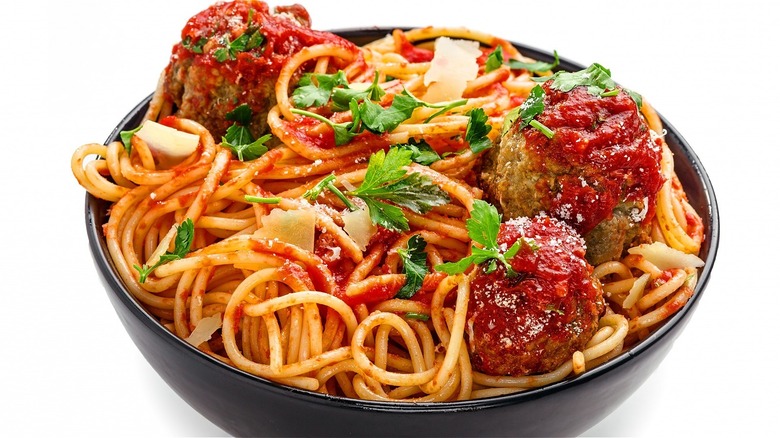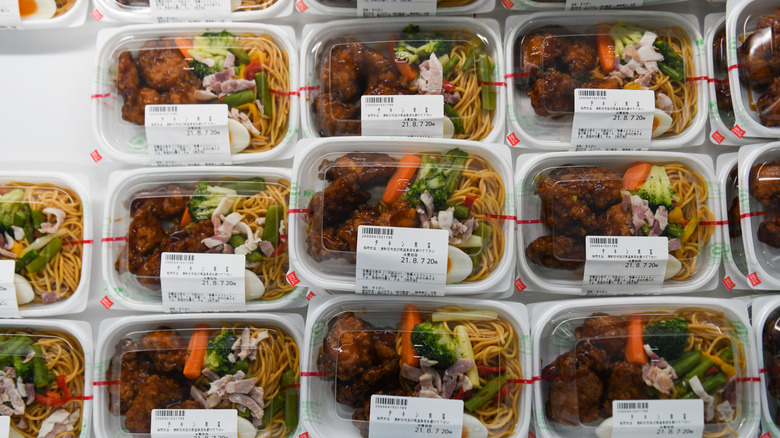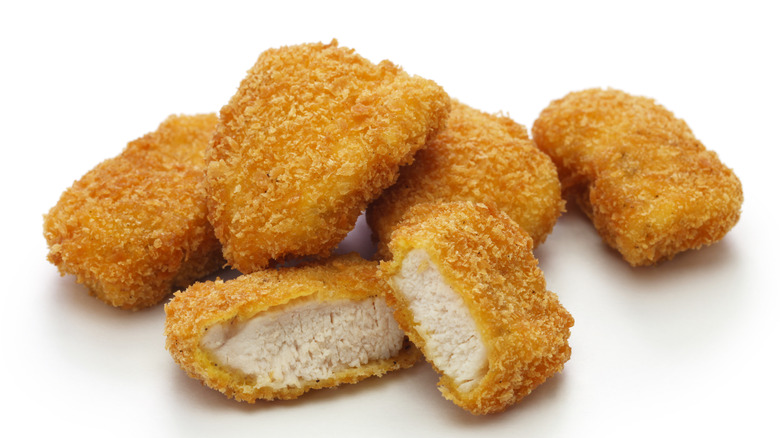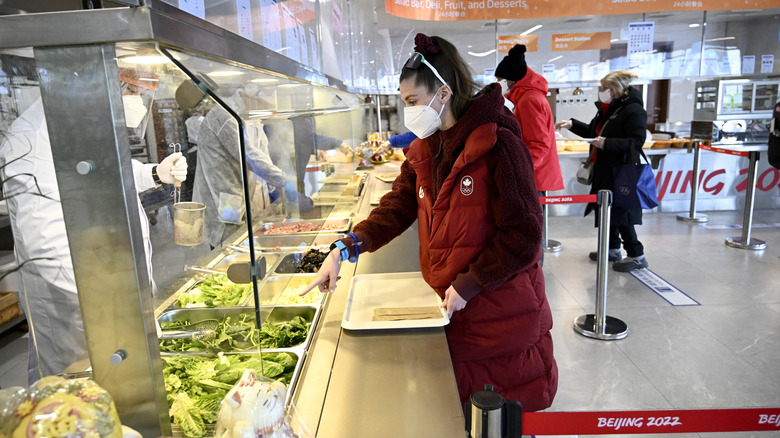Why The U.S. Brings Its Own Food To The Olympics
It should come as no surprise that athletes need an ungodly amount of calories, and that their nutritional requirements exceed that of mere mortals. So it should also come as no surprise that it takes an army of trained chefs and nutritionists to ensure that the athletes, coaches, volunteers, and support staff that make up Team USA are properly fed during the Olympic Games.
Meeting the delegation's nutritional needs is such an important task that between the 1968 Summer Games in Mexico City and the 2010 Winter Games in Vancouver, the job of feeding Olympians over 16 Games went to just one company, Philadelphia-based Aramark. The Philadelphia Inquirer described that task as "complex," which is putting it mildly, because chefs needed to be able to turn out between 60 to 70 thousand meals every day, on demand, from a kitchen that's been compared to the size of a football field, all for roughly $50 million dollars.
72,000 pounds of food were shipped to Tokyo
During the 2020 Tokyo Games (which were held in 2021), U.S. Olympic director of food and nutrition services Brian Knutson ballparked that over the course of the Games' 27 days, he and his staff would need to come up with 7,000 meals for Team USA's athletes and support staff. "Our teams mostly eat lean meats, chicken breast, fish and vegetarian meals and of course lots of pasta and meatballs," he told USA Today.
To meet this need, the US Olympic committee put together their version of a packed lunch, which involved shipping 72,000 pounds of food and drinks from the US Olympic and Paralympic Training Center to Japan. Seven local vendors were also pulled in to supply the catering team with essential ingredients, including "2,000 pounds of various proteins from an American-owned company in Japan" and "more than 350 pounds of salmon from a local fish vendor." The chefs were then tasked with preparing meals that come as close to the flavors of home as possible, and then serving it all up in a buffet.
Team USA shipped 25,000 lbs of protein to Beijing in 2008
The same cannot be said for Team USA's last experience in Beijing, site of the Summer Games in 2008. There were considerable challenges for caterers during those Games, because as The New York Times reported, proteins like chicken were found laced with steroids, while other ingredients were full of insecticides and potentially illegal veterinary drugs. In the end, sponsors like Tyson Foods and Kellogg's were eventually prevailed upon to help ship 25,000 pounds of protein which would be eventually be used to prepare over 1,500 recipes.
The food at the Beijing Olympics were so questionable that in his autobiography, legendary Jamaican runner Usain Bolt recalled: "Honestly, I ate nothing else in all my time out in China except chicken nuggets. They were the only food I could properly trust which wouldn't affect my stomach. On arriving at the [pre-Olympic] training camp I'd tried a local Chinese meal, which wasn't like the ones we eat in the West, and my body didn't react well. So, knowing I could rely on nuggets, i made up my mind that was all I would eat. And eat them I did, for breakfast, lunch and dinner, washed down with bottled water" (via NBC Sports).
Catering for the Winter Games has received mixed reviews
With COVID restrictions in place, it is difficult to envision how chefs and nutritionists for Team USA might be handling the food situation at this year's Winter Games in Beijing. Catering reviews have been mixed so far. Those unlucky to have tested positive are being served what athletes say is "impossible to eat" food in quarantine hotels, CBS Sports reports, while Team USA snowboarders Shaun White and Maddie Mastro get meals from buffet lines manned by staff covered from head to toe in PPE. White was heard saying "The food's really good" during a social media tour he gave fans (via The Daily Mail).
Over in the media center, a high-tech display of robotic chefs, bartenders, and servers snagged international attention, while in Yanqing, site of the Alpine course, Germany's coach Christian Schwaiger complained of a lack of hot food. "The catering is extremely questionable, because really it's not catering at all... I would have expected that the Olympic Committee is capable of providing hot meals," he said. "There are no hot meals. There are crisps, some nuts and chocolate and nothing else. This shows a lack of focus on high-performance sport" (via Saltwire).
But Team USA didn't have a problem with that — they showed up to the venue with pasta that only needed hot water to prepare.



